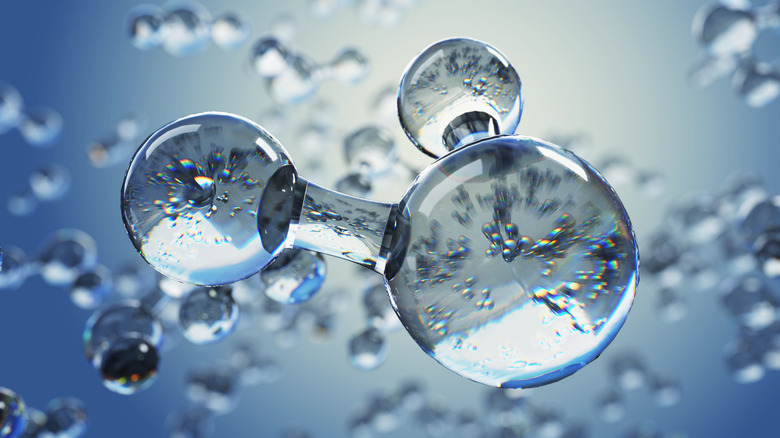Are Ions Hydrophobic Or Hydrophilic?
Ions are hydrophilic or attracted to water molecules because the water molecules are polar, with a negative charge at one end and a positive charge at the other end. The positively charged end of the water molecule attracts negatively charged ions and the negatively charged end positively charged ions. Because ions are attracted to the water molecules in this way, they are said to be hydrophilic. Materials made up of non-polar molecules tend to be hydrophobic or water-repelling.
TL;DR (Too Long; Didn't Read)
Ions are positively or negatively charged molecules and are therefore hydrophilic because they are attracted to polar-charged water molecules. The end of the water molecule with the oxygen atom is negatively charged while the hydrogen atom end is positively charged. The positively charged hydrogen atoms attract negatively charged ions and the oxygen atom attracts positively charged ions. Molecules without any charges such as non-polar molecules tend to be hydrophobic or repel water.
Ions and Polar Molecules
Ions and Polar Molecules
A water molecule is formed from two hydrogen atoms and an oxygen atom linked by two polar covalent bonds. These molecules are called polar because the charges are at the two opposite ends of the molecule. The the oxygen atom attracts the shared bonding electrons more strongly than the hydrogen atoms, so the oxygen end of the molecule is negatively charged while the two hydrogen atoms are positively charged.
Ions are atoms that have given up or received extra electrons and therefore have positive or negative charges. They form compounds with ionic bonds, meaning the positively and negatively charged ions of the compound attract each other. When the compound is dissolved in water, each ion is attracted to the water molecules and goes into solution. The ionic bonds result in hydrophilic compounds and ions.
For example, potassium chloride, KCl, is an ionic compound made up of potassium and chlorine ions. In water, the ions dissolve and dissociate into positively charged potassium ions and negatively charged chlorine ions. Both are attracted to the water molecules and are therefore hydrophilic.
Hydrophobic Molecules
Hydrophobic Molecules
Because water molecules are polar, they are attracted to each other. The negative oxygen end of the water molecule is attracted to one of the positively charged hydrogen atoms. The water molecules form comparatively weak intermolecular bonds called hydrogen bonds. Ions have a strong enough charge to break these bonds and other polar molecules can form similar bonds with hydrogen molecules. That is why ions and other polar molecules are hydrophilic.
Non-polar molecules don't have differently charged ends and so can't break the hydrogen bonds of the water molecules. The water molecules stay bonded to each other and the non-polar molecules can't dissolve. This means these materials, made up of non-polar molecules, are hydrophobic or water-repellent. Many fats and oils fall into this category. Contrary to ions, which are always hydrophilic due to their charge, the non-polar molecules separate out from water and can't dissolve.
Cite This Article
MLA
Markgraf, Bert. "Are Ions Hydrophobic Or Hydrophilic?" sciencing.com, https://www.sciencing.com/are-ions-hydrophobic-or-hydrophilic-13710245/. 27 March 2018.
APA
Markgraf, Bert. (2018, March 27). Are Ions Hydrophobic Or Hydrophilic?. sciencing.com. Retrieved from https://www.sciencing.com/are-ions-hydrophobic-or-hydrophilic-13710245/
Chicago
Markgraf, Bert. Are Ions Hydrophobic Or Hydrophilic? last modified March 24, 2022. https://www.sciencing.com/are-ions-hydrophobic-or-hydrophilic-13710245/
